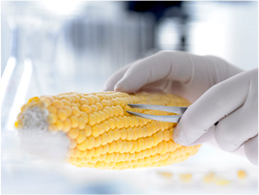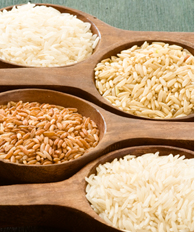Which Internet Food Rumors Are True?
Arsenic in rice! Toxins in salmon! GMOs everywhere! Before you freak, We find out which scares are worth your worry.
Practically everyone with an Internet connection has seen them by now: those links, often posted on Facebook by well-meaning friends, claiming that the foods we eat are filled with iffy chemicals and banned in every nation but our own. Rice seasoned with arsenic and sodas containing flame retardant sure sound hazardous, but are they really? Gold’s Gym investigates! We parsed the research to give you the bottom line on which foods are safe and which you should keep out of your cart.
FARM-RAISED SALMON

THE CONCERN: Farmed salmon, particularly from the North Atlantic, has been found to contain toxins like polychlorinated biphenyls (PCBs) and dioxins, which are industrial pollutants in the food the salmon is given.
THE VERDICT: Skip (when possible)
THE RESEARCH: Scientists found that North Atlantic farmed salmon had up to eight times the concentration of certain contaminants compared with wild fish. Dioxins are a known human carcinogen, while PCBs have been linked to cancer in animals and may trigger it in humans. Research has shown that babies of women exposed to high levels of PCBs are more likely to have neurological problems.
THE BOTTOM LINE: Go wild when possible. But if you can't find it, don't skip salmon, says Walter Willett, M.D., professor of epidemiology and nutrition at the Harvard School of Public Health: "While farmed salmon has some toxins, the nutritional benefits still outweigh the risks."
GENETICALLY MODIFIED CORN AND SOY

THE CONCERN: Nearly 90% of U.S. field corn has been genetically modified to kill insects or tolerate herbicides. Genetically modified organisms (GMOs) are used to make the corn flour, cornstarch, corn syrup and corn oil typically found in processed foods. They're also used in many products containing soy (but usually not edamame and tofu) and in livestock feed. Animal research suggests a link between GMOs and weight gain; some experts believe they may contribute to food allergies.
THE VERDICT: Dig in
THE RESEARCH: No studies have definitively connected GMOs to any health problems in humans. Meanwhile, there is concern about GMOs, but it's not what you think: As pests have developed resistance to some GMO crops, farmers have had to go back to using pesticides. And exposure to pesticides has been connected to negative health effects, from eye and skin irritations to cancer. Fortunately, the EPA limits the amount of pesticides allowed on food.
THE BOTTOM LINE: GMOs are likely okay, based on what is known at this point. But if you're worried about your GMO load, buy organic whenever you can. The USDA prohibits GMOs in organic foods.
RICE

THE CONCERN: Rice plants absorb arsenic from the soil. A 2012 Consumer Reports study found that people who ate a serving of rice had 44% higher levels of arsenic than those who hadn't. Ingesting high levels of the element may be linked to cancers.
THE VERDICT: Dig in
THE RESEARCH: The FDA recently announced that it had found no evidence that the levels of arsenic in rice are hazardous to our health in the short term. More research is needed to understand long-term effects.
THE BOTTOM LINE: Experts say go ahead. "I wouldn't worry about consuming rice every day," says John M. Duxbury, Ph.D., Cornell University professor of soil science and international agriculture. If you want to be extra cautious, eat a variety of grains, including basmati and jasmine rice, which generally absorb less arsenic than other varieties. And keep packaged foods (which can contain brown rice syrup) to a minimum.
First published in www.goldsgym.com. Edited and translated by Gold's Gym Indonesia.
Gold's Gym Mall Ciputra | Gold's Gym Mall of Indonesia | Gold's Gym Thamrin City | Gold's Gym Cilandak Town Square | Gold's Gym Baywalk Mall Pluit | Gold's Gym Kalibata City Mall | Gold's Gym Braga Citywalk | Gold's Gym Cihampelas Walk | Gold's Gym Summarecon Mall Serpong | Gold's Gym Mall @ Alam Sutera | Gold's Gym Bintaro X-change | Gold's Gym The Breeze BSD | Gold's Gym Grand City Surabaya | Gold's Gym Surabaya Town Square | Gold's Gym Grand Metropolitan Bekasi




